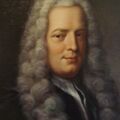Template:Selected anniversaries/July 31: Difference between revisions
No edit summary |
No edit summary |
||
| Line 22: | Line 22: | ||
||1804: Louis Necker dies ... mathematician, physicist, professor and a banker in Paris. He was the elder brother of Jacques Necker, minister of Finance in France when the French Revolution broke out. Pic. | ||1804: Louis Necker dies ... mathematician, physicist, professor and a banker in Paris. He was the elder brother of Jacques Necker, minister of Finance in France when the French Revolution broke out. Pic. | ||
||1858: Richard Dixon Oldham born ... seismologist and geologist ... Oldham made the first clear identification of the separate arrivals of P-waves, S-waves and surface waves on seismograms and the first clear evidence that the Earth has a central core. Pic. | ||1858: Richard Dixon Oldham born ... seismologist and geologist ... Oldham made the first clear identification of the separate arrivals of P-waves, S-waves and surface waves on seismograms and the first clear evidence that the Earth has a central core. Pic. | ||
Latest revision as of 18:50, 26 January 2022
1669: Isaac Newton becomes known. Lucasian professor Isaac Barrow sent John Collins a manuscript of Newton's De analysi and thereby Newton's anonymity began to dissolve. Although this manuscript was not published until 1704, it led to Newton's appointment as Lucasian professor on 29 October 1669.
1704: Mathematician and physicist Gabriel Cramer born. He will publish Cramer's rule, giving a general formula for the solution for any unknown in a linear equation system having a unique solution, in terms of determinants implied by the system.
1784: Philosopher, art critic, and writer Denis Diderot dies. He was a prominent figure during the Enlightenment, serving as co-founder, chief editor, and contributor to the Encyclopédie along with Jean le Rond d'Alembert.
1926: Philosopher, mathematician, and computer scientist Hilary Putnam born. He will argue for the reality of mathematical entities, later espousing the view that mathematics is not purely logical, but "quasi-empirical".



